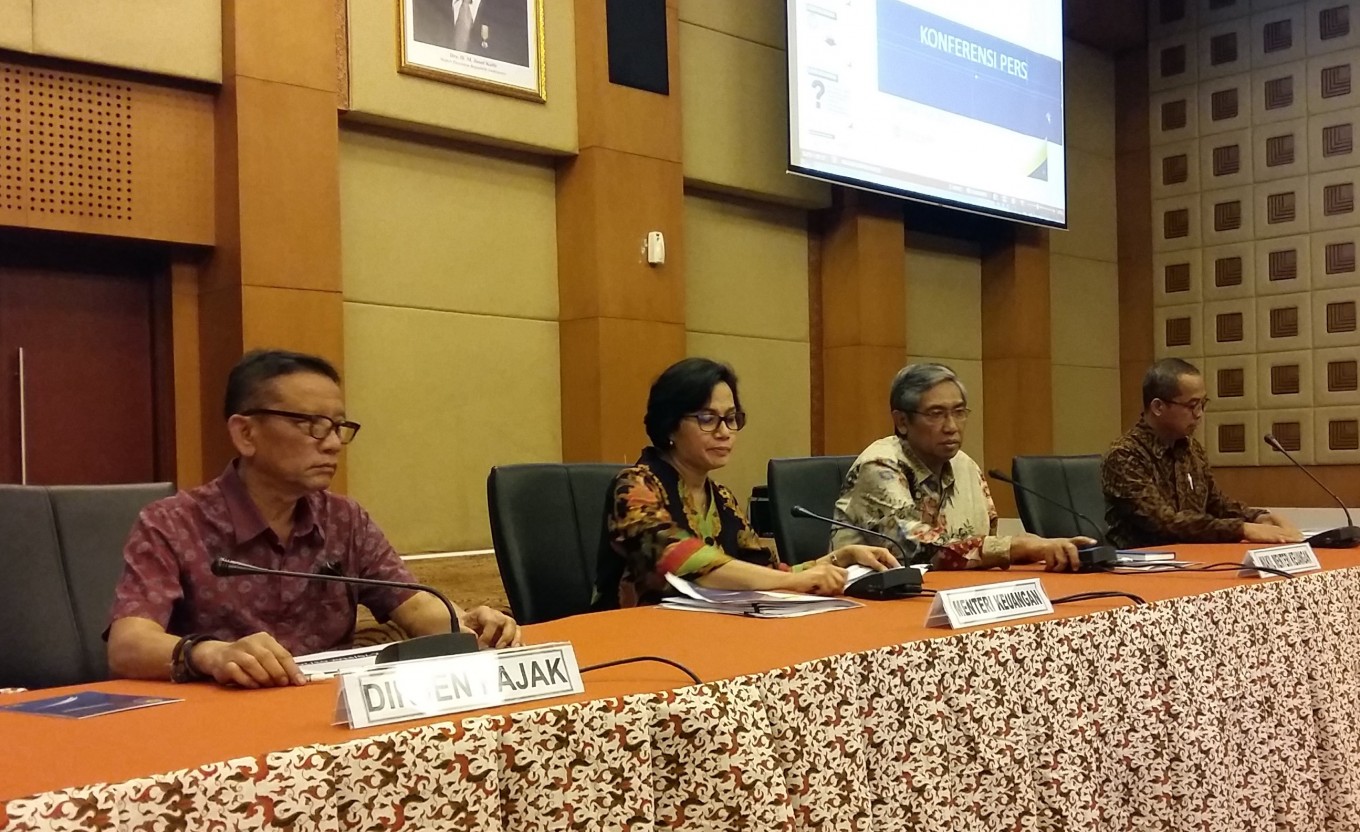Popular Reads
Top Results
Can't find what you're looking for?
View all search resultsPopular Reads
Top Results
Can't find what you're looking for?
View all search resultsEDITORIAL: After tax amnesty, repression
There are still many high net-worth individuals who refused to participate in the tax amnesty.
Change text size
Gift Premium Articles
to Anyone
 Taxmen: Taxation Director General Ken Dwijugiasteadi (from left to right), Finance Minister Sri Mulyani Indrawati, Deputy Finance Minister Mardiasmo , and Finance Ministry’s special staff members for tax compliance, Suryo Utomo, prepare for a press conference on Friday in Jakarta. (JP/Anton Hermansyah)
Taxmen: Taxation Director General Ken Dwijugiasteadi (from left to right), Finance Minister Sri Mulyani Indrawati, Deputy Finance Minister Mardiasmo , and Finance Ministry’s special staff members for tax compliance, Suryo Utomo, prepare for a press conference on Friday in Jakarta. (JP/Anton Hermansyah)
T
he filing of criminal charges with the South Jakarta Prosecutor’s Office against a suspected tax evader by the tax office on Wednesday is only the first step in a massive crackdown on tax evaders that Finance Minister Sri Mulyani Indrawati promised before the end of the sixmonth tax amnesty in March.
Even though the tax amnesty was billed one of the most successful in the world, resulting in almost US$10 billion in additional tax revenues and $365 billion worth of new assets being put into the tax net (declared), the government has concluded that there are still many high net-worth individuals who refused to participate in the tax amnesty. The assets of Indonesian citizens within the country and overseas declared are also way below the official estimate. Indonesia’s tax ratio (against gross domestic product), around 11 percent at present, is indeed the lowest in the ASEAN region and is way below the minimum 15 percent threshold necessary to stimulate growth.
In the first half alone, the Directorate General of taxation had 52 recalcitrant taxpayers detained for failing to settle their tax debts, as against 58 throughout last year and only 28 in 2015.
The South Jakarta Tax Office, the 10th-biggest contributor to national tax collection, has promised to lay tax criminal charges against at least four more taxpayers this year.
Unlike the detention of tax debtors who will be immediately released after they settle their tax debts, taxpayers with criminal charges filed with the prosecutor’s office will go on trial at the district court and be charged with both tax crimes and money laundering.
Many studies have indeed shown that a strong deterrent, resulting from strong law enforcement such as audits, effective oversight and prosecution, is an important aspect in convincing taxpayers to be voluntarily compliant as they know that the cost of tax evasion (detection) is quite high. It would be more effective if the aspect of deterrence is supported by strong personal and social norms against noncompliance, which are the foundations for a tax culture.
But given the inadequate technical knowledge of public prosecutors on tax matters, the Directorate General of Taxation needs to cooperate closely with the Attorney General’s Office in preparing dossiers on suspected tax evaders.
Of no less importance is that the Finance Ministry should see to it that the data bases and benchmarks of all tax offices across the country are properly interconnected so that can make an accurate mapping of tax potential, and consequently set realistic tax revenue targets.
In addition, Sri Mulyani needs to step up training to upgrade the technical competence of tax officials, given the increasing complexity of business and financial transactions, and develop stronger internal control to maintain their integrity in order to minimize the mutual distrust that still lingers between taxpayers and tax officials.
Only with higher competence and stronger integrity will the tax office be able to conduct stronger enforcement of tax laws, which in turn is a prerequisite for building up a stronger deterrence to tax evasion and for increasing voluntary tax compliance.









